 Petzlover
Petzlover Russian Spaniel is originated from Russia but Schillerstovare is originated from Sweden. Russian Spaniel may grow 16 cm / 6 inches shorter than Schillerstovare. Russian Spaniel may weigh 9 kg / 19 pounds lesser than Schillerstovare. Both Russian Spaniel and Schillerstovare has almost same life span. Both Russian Spaniel and Schillerstovare has almost same litter size. Russian Spaniel requires Moderate Maintenance. But Schillerstovare requires Low Maintenance
Russian Spaniel is originated from Russia but Schillerstovare is originated from Sweden. Russian Spaniel may grow 16 cm / 6 inches shorter than Schillerstovare. Russian Spaniel may weigh 9 kg / 19 pounds lesser than Schillerstovare. Both Russian Spaniel and Schillerstovare has almost same life span. Both Russian Spaniel and Schillerstovare has almost same litter size. Russian Spaniel requires Moderate Maintenance. But Schillerstovare requires Low Maintenance
 The Russian Spaniel is a gun dog which has originated from the English Cocker Spaniel and the English Springer Spaniel. Today while he is a gun dog he is more of a companion dog.
The Russian Spaniel is a gun dog which has originated from the English Cocker Spaniel and the English Springer Spaniel. Today while he is a gun dog he is more of a companion dog.
The Russian Spaniel has been spoken about since 1891. Different Spaniel breeds were imported to Russia to be used for hunting but some of the smaller spaniels weren't suited to the weather conditions.
At the beginning of the 20th century, breeding programs got underway for longer legged spaniels, and by the late 1930's there were a variety of different spaniels in Moscow.
After World War II, more purposeful breeding got underway and this led to the the Russian Spaniel standard in 1951. The popularity of the dog has increased and in 2002 the Russian Spaniel Club was set up in the United States. The dog isn’t recognised by any major kennel clubs.
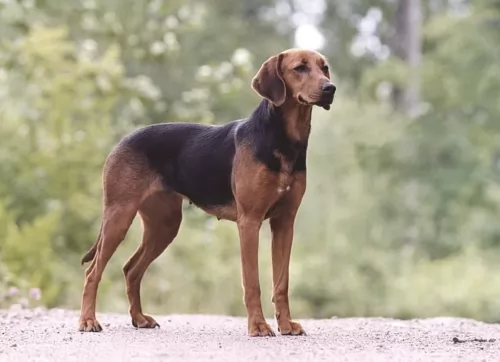 The Schillerstövare originated in Sweden, being named after a Swedish farmer, Per Schiller. After he died, the dog was named Schillerstövare in 1907, and was Sweden's first native dog breed.
The Schillerstövare originated in Sweden, being named after a Swedish farmer, Per Schiller. After he died, the dog was named Schillerstövare in 1907, and was Sweden's first native dog breed.
The Swedish Kennel Club recognised this dog in 1907 and it is also recognised by the Federation Cynologique Internationale as well as a number of minor kennels and dog clubs.
The dog has always been used as a hunting dog and the English Foxhound is the e foundation for this breed.
 The attractive little Russian Spaniel stands at 38 – 45cm in height ad weighs between 9 and 16kg. He is such a sturdy little dog too, looking very similar to the English Cocker Spaniel.
The attractive little Russian Spaniel stands at 38 – 45cm in height ad weighs between 9 and 16kg. He is such a sturdy little dog too, looking very similar to the English Cocker Spaniel.
The coat is short and silky with quite a bit of feathering around the legs and ears. Colors of the coat can be anything from reddish brown and white with freckles to black and white with freckles.
Aside from the Russian Spaniels' hunting abilities, they make great family pets and are playful with children.They’re devoted to their human families and become particularly attached to one person in the family.
Such devotion leads them to being a bit cool around strangers, not liking anyone unfamiliar to get too close to any of his family members.
He is intelligent and can be easily trained to obey simple commands such as sit, stay, lie down and come.
The Russian Spaniel can be happy in the suburbs, on a farm or in the city so long as he gets lots of attention and enough exercise.
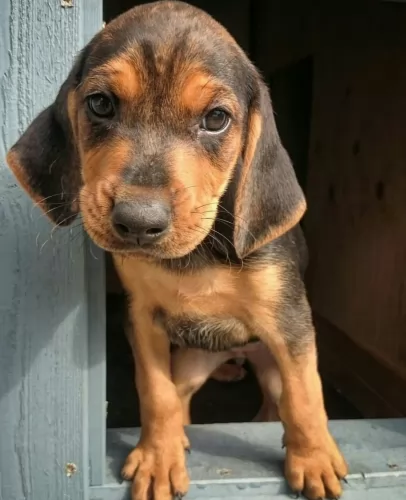 The Schillerstövare is a medium to large sized dog. They’re athletic and muscular.
The Schillerstövare is a medium to large sized dog. They’re athletic and muscular.
Standing at between 53–61cm in height and weighing in the region of 18–25kg, the coat of the dog is fairly short and harsh, with the color being black and tan.Sometimes you’ll see some white markings on the chest and paws.
The head is domed, the eyes brown, bright and alert and the ears of the dog are broad, medium length and floppy. The long tail is carried low or held out when running or alert.
If you allow your Schillerstovare to have puppies, you can expect between 3 to 7.
The Schillerstovare is a calm dog but he can get petty lively when there’s a game to be had. He gets on well with well disciplined children who have been taught to be kind and respectful to animals. He also gets on well with pets in the home. Just like with most other dogs, he will need to be trained and socialized as he is a strong willed, confident, dominant dog.
He is friendly and active but will be somewhat reserved around strangers.These dogs will require a lot of exercise and will need quite a bit of space too. They aren't well suited to small properties in the city. He will need a daily walk but also a chance to get off his leash and run free in the park. Other forms of exercise such as hikes, ball game and swimming will delight him.
 The Russian Spaniel is such an energetic, dog, full of life ad with the joys of being alive.
The Russian Spaniel is such an energetic, dog, full of life ad with the joys of being alive.
Although he was a gun dog, today he is loved for his companionship. He makes a splendid family pet and loves to be involved with the games of children.
He is easy-going and social, and just wants to spend as much time as he can with his human family. Give him all the love you have and you'll see his tail never stops wagging.
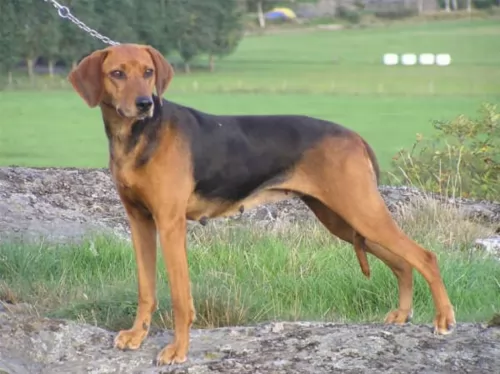 Schillerstovares are social, loving, friendly, loyal dogs who enjoy being around their human family. He’s going to need a lot of exercise, both mental and physical to keep him from boredom and frustration.
Schillerstovares are social, loving, friendly, loyal dogs who enjoy being around their human family. He’s going to need a lot of exercise, both mental and physical to keep him from boredom and frustration.
He will rely on you for at least a daily walk. He is strong-will and confident and will do well in a family where they are active and where they are firm, patient, kind and consistent in their behaviour towards him because then he ticks all th right boxes for being a splendid pet.
 With very few health problems, the feisty Russian Spaniel can get to 12-14 years of age. Nonetheless, there are always some of the more common health issues to look out for.
With very few health problems, the feisty Russian Spaniel can get to 12-14 years of age. Nonetheless, there are always some of the more common health issues to look out for.
Russian Spaniels are prone to developing ear infections. Ear infections can be terribly frustrating for a dog and they are quite difficult to clear up. It is advised that dog owners use ear cleaners before infection sets in. The vet can advise you on this as you have to be careful not to damage the inside of the ear.
Itchy skin can be another terrible frustration for a dog. Allergies often cause terrible itching, and your dog will go mad trying to gnaw and bite at the itch. Finding the specific cause of a skin allergy can be very challenging. Blood tests might be required. It is imperative to feed your dog some raw meat occasionally to avoid these terrible skin infections.
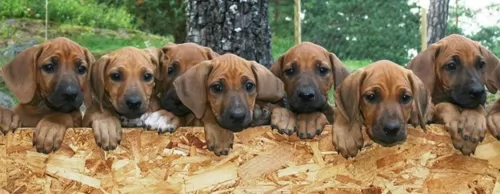 Even though your Schillerstovare is a healthy dog breed, hip dysplasia is a common dog disease that many dogs get.
Even though your Schillerstovare is a healthy dog breed, hip dysplasia is a common dog disease that many dogs get.
This is a skeletal disease when a dog’s hip joints become partially dislocated. It can be very difficult for your dog to get around, and he can also develop arthritis. It gets very sad when your dog doesn’t even want to participate in games anymore.
 This dog was raised to be a gun dog, and is used to having plenty of exercise. Most imperative for him will be a couple of walks each day plus lots of chase-the-ball games. These dogs just never seem to get tired as they are playful and will never let the chance of a game pass them by.
This dog was raised to be a gun dog, and is used to having plenty of exercise. Most imperative for him will be a couple of walks each day plus lots of chase-the-ball games. These dogs just never seem to get tired as they are playful and will never let the chance of a game pass them by.
Spaniel ears require quite a bit of upkeep as the hair can become extremely matted, forming balls of knotted hair. The inside of the ears must be constantly checked for infection. The spaniel’s coat will need to be brushed regularly and he can even go to the groomers and get a short Spaniel cut.
Contribute to your pet’s good health by providing him with top notch food. A good nutritious diet for the Russian Spaniel will give your dog less of a chance to get sick. Always go for the best quality commercially manufactured dog foods.
To provide your dog with just a bit of variety in his diet, some home-made food added into the dry kibble from time to time will delight your pet. No need to make preparing the food a huge issue either. Boil brown rice and chicken in a pot and add in sweet potatoes, carrots and spinach. Chop all this up, and as a treat, add smaller portions of it into the dry kibble.To avoid skin infections, try to include some raw meat into his diet occasionally.
Never leave your pet without a constant source of fresh, cool water
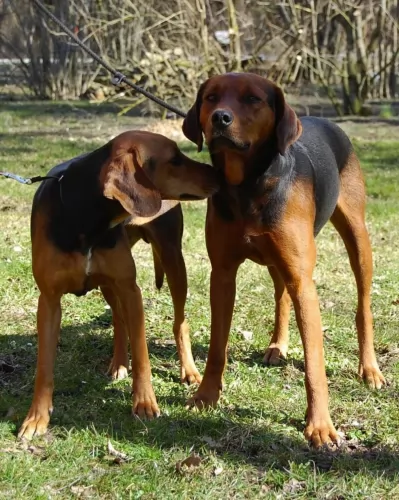 With his short coat, the Schillerstovare is considered a low maintenance dog and requires a minimal amount of grooming. Brushing should be done twice a week to remove loose hair. The harsh outer coat seems to repel dirt and dust.
With his short coat, the Schillerstovare is considered a low maintenance dog and requires a minimal amount of grooming. Brushing should be done twice a week to remove loose hair. The harsh outer coat seems to repel dirt and dust.
Trim your pet’s nails, check inside his ears for signs of redness, make sure his eyes are bright and clear and make sure he doesn’t have any unusual lumps on him.
Make sure his vaccines are up to date to avoid deadly canine diseases. Take him to the vet when you suspect he isn’t his normal self.
Dogs, just like humans, do well on good, nutritious diets. Feed a human lots of junk food and sweets and they’ll grow up to be obese and unhealthy. That's exactly how it is with dogs too. Some of the best commercially manufactured dog foods are convenient and they can be good if you look at the top brands. Look for ones that cater for your dog’s age, size, breed and activity levels. This dry kibble can be made more inviting for your pet when you include some homemade food.
Dogs just want simplicity so that they don’t battle with digestive problems. Boiled chicken, sweet potatoes, brown rice or pasta, carrots and spinach will be wonderful for him when you chop the food up and add it into the dry kibble twice a week. See his tail wag and his brown eyes light up when he smells this treat. Some raw meat added up occasionally will also contribute to your pet’s heath.
Make sure he is never without a constant supply of fresh, cool water.